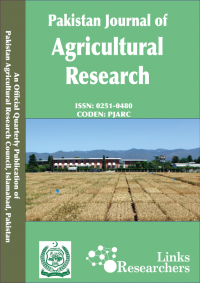Naheed Akhtar, Noreen Moin, Ghulam Jilani*, Ata ul Mohsin**, Shaheena Yasmin, Afzala Tashfeen*, Munir Goraya**** and Irshad Begum*
ABSTRACT
For the evaluation of resistance, twelve rainfed wheat varieties/ lines of National Uniform Wheat Yield Trials (NUWYT) 2004-05 were used. Among the tested germplasm (one variety and 11 lines of wheat), V-5 line was found resistant and NRL-2017 line was found susceptible to Rhopalosiphum padi. The results of Antixenosis Test indicated that two wheat lines, V-5 and PR-83 were least preferred and three lines viz., NRL-2017, V-00055 and V-00BT004 were highly preferred by the test insect. The results of Antibiosis Test showed that PR-83 line was least fecund whereas NR-241 and V-00055 lines were highly fecund. The results of Tolerance Test indicated that four varieties, PR-83, V-5, SN-128 and NR-241 were highly tolerant, while only one line, V-00BT004 was least tolerant. To avoid harmful effects of this insect pest, only resistant, least preferred, least fecund and highly tolerant lines must be used in wheat breeding programmes.
To share on other social networks, click on any share button. What are these?






